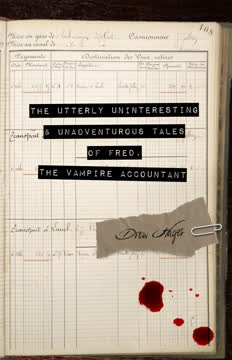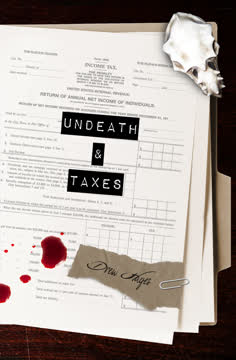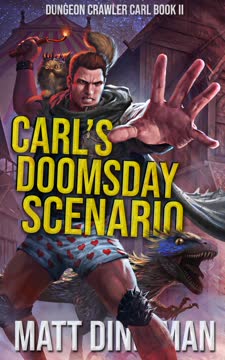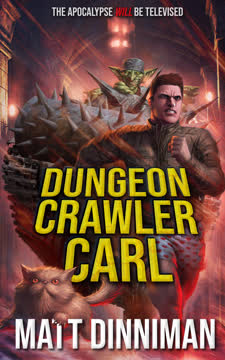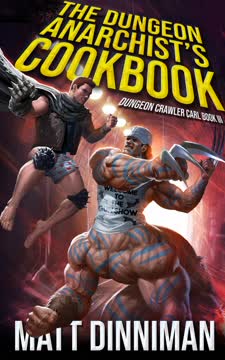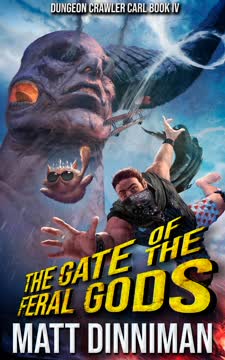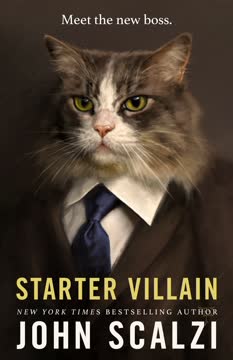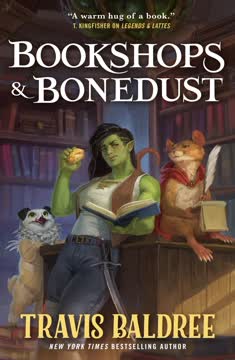Plot Summary
Fred's Unwanted Invitation
Fredrick Frankford Fletcher, a mild-mannered vampire accountant, is unexpectedly visited by his sire, Quinn, and his powerful lackey, Beauregard. They break into Fred's apartment, taking his girlfriend, Krystal, hostage. Quinn demands Fred meet him at a church by midnight if he wants to save her. Fred, who has always avoided confrontation, is thrust into a situation where he must face his fears and the darker side of his vampire nature.
A Vampire's Dilemma
Fred's friends, including Bubba the weresteed, Neil the necromancer, Albert the zombie, and Amy the alchemist, gather to devise a plan to rescue Krystal. They realize Quinn's plan is to turn Fred into a monster by exploiting his vampire nature. Neil suggests using a spell to amplify Fred's powers, but Fred is hesitant, fearing the loss of control. Instead, they concoct a plan to deceive Quinn and save Krystal without turning Fred into a monster.
The Unexpected Allies
The group seeks assistance from Richard, the weremayor, and Gideon, a dragon in disguise. Richard agrees to help due to his connection to Amy, who is a mentor to his daughter. They track Krystal's scent to a park, where they encounter magical constructs set by Quinn. Fred narrowly escapes a trap, realizing the extent of Quinn's preparations and the danger they face.
A Dangerous Game
Fred and his friends arrive at the church, where Quinn has set a trap with ghouls and Beauregard. Fred, using a potion from Amy, pretends to be under the influence of a powerful spell, appearing as a monstrous version of himself. This deception allows Neil to cast a spell that freezes the ghouls and Beauregard, giving Fred a chance to confront Quinn and free Krystal.
The Trap is Set
As Fred struggles against Quinn, Krystal reveals her true nature. She is a vessel for a devil, a powerful being that revives her upon death. With her devilish powers unleashed, Krystal easily dispatches Beauregard and turns her wrath on Quinn. However, Quinn manages to escape, leaving Fred and Krystal to deal with the aftermath.
Krystal's Secret Unveiled
In the safety of her apartment, Krystal explains her heritage to Fred. She is part of a bloodline that binds devils, granting her incredible powers and immortality until she passes the curse to a daughter. Fred learns that Krystal's agency role is to manage supernatural threats, and her powers are both a blessing and a curse.
A New Understanding
Despite the dangers and secrets, Fred and Krystal reaffirm their commitment to each other. Fred realizes that his life, though more dangerous, is also more fulfilling with Krystal and his friends. They agree to face future challenges together, embracing their unique roles in the supernatural world.
Characters
Fredrick Frankford Fletcher
Fred is a vampire who struggles with his new identity, preferring a quiet life as an accountant. Despite his fears, he shows courage and loyalty to his friends, ultimately embracing his role in the supernatural world.
Krystal Jenkins
Krystal is Fred's girlfriend and a government agent who manages supernatural threats. Her hidden power as a devil vessel makes her a formidable force, though it complicates her relationship with Fred.
Quinn Thames
Quinn is Fred's sire, who seeks to unleash Fred's potential as a monster. His plans are thwarted by Fred's friends and Krystal's unexpected powers.
Beauregard
Beauregard is Quinn's powerful henchman, enhanced by drinking therian blood. He is ultimately defeated by Krystal's devilish transformation.
Neil
Neil is a friend of Fred's, learning magic under Amy's guidance. His quick thinking and spellcasting play a crucial role in the rescue mission.
Albert
Albert is Fred's loyal assistant, providing support and comic relief. His unwavering optimism helps keep the group together.
Amy Wells
Amy is Neil's mentor and a skilled alchemist. Her potions and knowledge are vital to the group's success in rescuing Krystal.
Bubba Emerson
Bubba is a weresteed who aids Fred in his quest to save Krystal. His strength and courage are invaluable in the face of danger.
Richard
Richard is the leader of the therians in the area, who assists Fred due to his connection with Amy. His strength and authority are crucial in the group's efforts.
Gideon
Gideon is a dragon posing as a child, with immense power and influence. His presence adds a layer of complexity to the supernatural dynamics.
Plot Devices
Mortis Invictus Spell
This spell is central to Quinn's plan to turn Fred into a monster. It enhances a vampire's abilities but also increases aggression and bloodlust, making it a double-edged sword.
Krystal's Devil Heritage
Krystal's ability to transform into a devil is a key plot device, revealing her true strength and complicating her relationship with Fred. It serves as both a blessing and a curse.
Supernatural Alliances
Fred's connections with various supernatural beings, including Richard and Gideon, highlight the importance of alliances in navigating the parahuman world. These relationships are crucial to overcoming challenges.
Analysis
"The Utterly Uninteresting and Unadventurous Tales of Fred, the Vampire Accountant" delves into themes of identity, power, and the struggle to balance one's nature with societal expectations. Fred's journey from a timid accountant to a courageous vampire reflects the broader human experience of self-discovery and acceptance. The novel also examines the complexities of relationships in a world where supernatural elements add layers of danger and intrigue. Through humor and heart, Drew Hayes crafts a narrative that challenges traditional vampire tropes, offering a fresh perspective on the genre.
Last updated:
FAQ
Synopsis & Basic Details
What is The Utterly Uninteresting and Unadventurous Tales of Fred, the Vampire Accountant about?
- Mundane Vampire's New Life: The story follows Fredrick Frankford Fletcher, a mild-mannered accountant who unexpectedly becomes a vampire. Far from the glamorous, dangerous existence portrayed in media, Fred's unlife initially remains utterly uninteresting and unadventurous, focused on taxes and avoiding conflict.
- Accidental Heroism & Found Family: Despite his best efforts to maintain a quiet existence, Fred repeatedly finds himself embroiled in supernatural mishaps, from high school reunions attacked by werewolves to LARP events gone awry. Through these "unadventurous" escapades, he slowly builds an unconventional circle of parahuman friends, including a government agent, a zombie, a weresteed, and mages.
- Embracing the Extraordinary Ordinary: The overarching narrative explores Fred's reluctant journey of self-discovery, as he learns to navigate the hidden world of parahumans, confront his fears, and ultimately find purpose and belonging not by becoming a stereotypical monster, but by remaining true to his uniquely mundane self.
Why should I read The Utterly Uninteresting and Unadventurous Tales of Fred, the Vampire Accountant?
- Genre-Bending Humor: This book brilliantly subverts traditional vampire tropes, offering a fresh, humorous take on the supernatural. If you're tired of brooding, angsty vampires, Fred's relatable anxieties and accounting-based problem-solving will be a delightful change.
- Heartfelt Found Family Themes: Beyond the laughs, the story excels at building a diverse and endearing cast of characters who form a loyal, supportive "found family." Readers will connect with the genuine bonds and emotional growth, making it more than just a comedy.
- Unique World-Building & Social Commentary: Drew Hayes crafts a world where the supernatural is integrated into society with surprising bureaucracy and mundane rules (e.g., zombie work visas, magic licenses). This clever backdrop provides both comedic opportunities and subtle commentary on societal norms and prejudice.
What is the background of The Utterly Uninteresting and Unadventurous Tales of Fred, the Vampire Accountant?
- Integrated Supernatural Society: The world of Fred is one where parahumans (vampires, werewolves, mages, etc.) exist, but largely in secret. Treaties and an unseen government agency (The Agency) regulate their interactions with humans and each other, creating a complex, bureaucratic hidden society.
- American History Reimagined: The narrative subtly recontextualizes American history, revealing that parahumans played a crucial, albeit hidden, role in events like the Revolutionary War, securing their rights and territories in exchange for aid. This adds a rich, intertextual layer to the world-building.
- Modern Mundanity Meets Ancient Lore: The story grounds ancient supernatural beings in contemporary, relatable settings like high school reunions, LARP events, and casinos. This juxtaposition highlights the humor and challenges of maintaining a secret identity in a modern, often uninteresting, world.
What are the most memorable quotes in The Utterly Uninteresting and Unadventurous Tales of Fred, the Vampire Accountant?
- "One's nature is hard to change; sometimes even death is insufficient to accomplish such a task.": This opening line from Fred's memoir perfectly encapsulates the central theme of identity and self-acceptance, setting the stage for his struggle to reconcile his mundane personality with his supernatural transformation. It's a core insight into Fred's character analysis.
- "We aren't human, but that doesn't make us monsters.": Spoken by Albert, the cheerful zombie, this quote is a powerful declaration of the book's thematic core: challenging the traditional definition of "monster." It highlights the found family's acceptance and Fred's journey towards self-worth.
- "I spent my whole life being very cautious and very safe, and it ended with me very dead under a dumpster. Perhaps I'm not the sort who can overhaul his entire personality with one death. However, I have at least learned enough to not shy away from something that has made my world, while more dangerous, also impossibly more worth being in.": Fred's poignant reflection at the end of the book summarizes his profound character arc, revealing his newfound courage and appreciation for the "dangerous" but fulfilling life he's built, offering a deep insight into Fred's motivations.
What writing style, narrative choices, and literary techniques does Drew Hayes use?
- First-Person, Conversational Narrative: The story is told from Fred's perspective, characterized by his dry wit, self-deprecating humor, and meticulous internal monologues. This narrative choice allows readers deep insight into Fred's anxieties and thought processes, making his "uninteresting" observations highly engaging.
- Subversion of Genre Tropes: Hayes consistently plays with and subverts common vampire and fantasy tropes. Fred's aversion to violence, his love for accounting, and the bureaucratic nature of the supernatural world all serve to deconstruct traditional genre expectations, creating a unique comedic tone.
- Juxtaposition and Irony: The author frequently employs juxtaposition, placing mundane details (like Scrabble games or Taco Bell runs) alongside extraordinary supernatural events. This creates a strong sense of irony, emphasizing Fred's struggle to maintain normalcy in an increasingly abnormal existence, a key element of the book's themes.
Hidden Details & Subtle Connections
What are some minor details that add significant meaning?
- Fred's Persistent Glasses and Sweater Vest: Despite gaining perfect vision and enhanced strength as a vampire, Fred continues to wear fake glasses and his signature sweater vest. This isn't just a quirk; it symbolizes his deep-seated comfort in his former human identity and his resistance to fully embracing the "cool" vampire stereotype, a subtle detail in Fred's character analysis.
- Krystal's Physiological "Tells": Fred, with his heightened vampire senses, can detect Krystal's increased heart rate and pheromone release when she flirts or is under stress. This detail provides a unique insight into Krystal's true emotions beneath her confident Agent facade, highlighting her vulnerability and the depth of Fred's perception.
- The Mundane Bureaucracy of Parahumans: Details like zombie work visas, magic licenses, and dracoling treaties are not just comedic; they underscore the pervasive theme that even the supernatural world is subject to mundane rules and regulations, subverting typical fantasy grandeur and grounding the story in a relatable, if absurd, reality.
What are some subtle foreshadowing and callbacks?
- Krystal's Unexplained Resilience and Combat Prowess: Early in the book, Krystal demonstrates unusual strength and an uncanny ability to handle dangerous situations (e.g., easily dispatching werewolves, her "wand of brain shocking"). These moments subtly foreshadow her devil heritage and immense power, hinting at a deeper secret long before its full revelation.
- Fred's Constant Discrepancies with Vampire Lore: Fred frequently notes how his vampiric reality differs from cinematic portrayals (e.g., not sleeping in a coffin, enjoying cheese). This recurring motif subtly prepares the reader for the eventual revelation of complex parahuman abilities and limitations, including his own unique nature and Krystal's powers.
- Gideon's Ancient Authority and "Old" Voice: The weremayor Richard's profound respect for Gideon, coupled with Gideon's unnervingly mature voice despite his child form, subtly foreshadows his true identity as an ancient, powerful dragon and "King of the West," hinting at the vast, hidden history of the parahuman world.
What are some unexpected character connections?
- Bubba's Unspoken Affection for Fred: Bubba's intense loyalty and protectiveness towards Fred, culminating in Krystal's playful revelation that Bubba has a "crush" on Fred (mistakenly thought to be for Krystal), adds an unexpected layer of emotional depth and humor to their friendship, enriching Bubba's motivations.
- Neil's Redemption Through Friendship: Neil, initially a megalomaniacal necromancer, transforms into a devoted apprentice and loyal friend, driven by his genuine care for Albert and Amy. This unexpected character arc highlights the power of positive influence and the formation of a found family, a key theme in Fred the Vampire Accountant.
- Amy's Mundane Origin of Magic: Amy's admission that she got into alchemy and magic because she "wanted to get better with botany" to "grow some killer weed" provides a surprisingly relatable and humorous origin for a powerful mage. This detail connects her grounded, pragmatic nature to Fred's own "uninteresting" approach to the supernatural.
Who are the most significant supporting characters?
- Albert, the Unwavering Moral Compass: Despite being a zombie, Albert's relentlessly cheerful demeanor and earnest goodness often serve as the emotional anchor for the group. His simple, unwavering belief in Fred's kindness and his willingness to sacrifice for his friends highlight Fred's positive influence and the inherent goodness that can exist even in the undead.
- Bubba, the Steadfast Protector and Loyal Friend: Beyond his weresteed abilities, Bubba's fierce loyalty and willingness to put himself in harm's way (e.g., riding as a pony in the joust, confronting dracolings) underscore the theme of chosen family. His gruff exterior hides a deep emotional connection to his friends, making him a crucial ally and a source of unexpected humor.
- Amy, the Pragmatic Genius and Unconventional Mentor: Amy's brilliance as an alchemist and mage, combined with her surprisingly down-to-earth origins and her role as Neil's mentor, makes her an indispensable problem-solver. Her practical approach to magic and her willingness to bend rules for her friends provide critical support and a unique perspective on the parahuman world.
Psychological, Emotional, & Relational Analysis
What are some unspoken motivations of the characters?
- Quinn's Desire for Validation: Quinn's relentless pursuit of turning Fred into a ruthless monster isn't just about power; it's a desperate attempt to validate his own rigid, traditional view of vampirism and his role as a sire. Fred's mildness is a personal affront to Quinn's vampiric philosophy, driving his manipulative actions.
- Krystal's Search for Authentic Connection: Krystal's willingness to reveal her deeply dangerous devil heritage to Fred, despite the risks to her career and safety, stems from a profound need for a relationship built on genuine honesty and acceptance, contrasting with the constant secrecy her Agent life demands. This is a key aspect of Krystal's motivations.
- Fred's Subconscious Yearning for Purpose: While Fred consciously desires an "uninteresting" life, his repeated, albeit reluctant, acts of heroism and his growing attachment to his parahuman friends reveal a subconscious yearning for purpose and belonging that his human life lacked. His actions speak louder than his words in defining Fred's motivations.
What psychological complexities do the characters exhibit?
- Fred's "Cowardice" as a Strategic Advantage: Fred's deep-seated aversion to conflict, initially a source of shame, paradoxically becomes a unique strength. His reliance on meticulous planning, observation, and clever deception (like pretending to be a baseball player during the joust) demonstrates that intelligence and ingenuity can be more effective than brute force, offering a fresh perspective on Fred's character analysis.
- Albert's Optimism as a Coping Mechanism: Albert's unwavering cheerfulness as a zombie, despite his traumatic death and precarious existence, can be interpreted as a profound psychological resilience. It might also be a coping mechanism, a way to maintain a positive outlook in a world that often views him as a disposable undead servant, adding depth to Albert's motivations.
- **Krystal's
Synopsis & Basic Details
What is The Utterly Uninteresting and Unadventurous Tales of Fred, the Vampire Accountant about?
- Mundane Vampire's New Life: The story follows Fredrick Frankford Fletcher, a mild-mannered accountant who unexpectedly becomes a vampire. Far from the glamorous, dangerous existence portrayed in media, Fred's unlife initially remains utterly uninteresting and unadventurous, focused on taxes and avoiding conflict.
- Accidental Heroism & Found Family: Despite his best efforts to maintain a quiet existence, Fred repeatedly finds himself embroiled in supernatural mishaps, from high school reunions attacked by werewolves to LARP events gone awry. Through these "unadventurous" escapades, he slowly builds an unconventional circle of parahuman friends, including a government agent, a zombie, a weresteed, and mages.
- Embracing the Extraordinary Ordinary: The overarching narrative explores Fred's reluctant journey of self-discovery, as he learns to navigate the hidden world of parahumans, confront his fears, and ultimately find purpose and belonging not by becoming a stereotypical monster, but by remaining true to his uniquely mundane self.
Why should I read The Utterly Uninteresting and Unadventurous Tales of Fred, the Vampire Accountant?
- Genre-Bending Humor: This book brilliantly subverts traditional vampire tropes, offering a fresh, humorous take on the supernatural. If you're tired of brooding, angsty vampires, Fred's relatable anxieties and accounting-based problem-solving will be a delightful change.
- Heartfelt Found Family Themes: Beyond the laughs, the story excels at building a diverse and endearing cast of characters who form a loyal, supportive "found family." Readers will connect with the genuine bonds and emotional growth, making it more than just a comedy.
- Unique World-Building & Social Commentary: Drew Hayes crafts a world where the supernatural is integrated into society with surprising bureaucracy and mundane rules (e.g., zombie work visas, magic licenses). This clever backdrop provides both comedic opportunities and subtle commentary on societal norms and prejudice.
What is the background of The Utterly Uninteresting and Unadventurous Tales of Fred, the Vampire Accountant?
- Integrated Supernatural Society: The world of Fred is one where parahumans (vampires, werewolves, mages, etc.) exist, but largely in secret. Treaties and an unseen government agency (The Agency) regulate their interactions with humans and each other, creating a complex, bureaucratic hidden society.
- American History Reimagined: The narrative subtly recontextualizes American history, revealing that parahumans played a crucial, albeit hidden, role in events like the Revolutionary War, securing their rights and territories in exchange for aid. This adds a rich, intertextual layer to the world-building.
- Modern Mundanity Meets Ancient Lore: The story grounds ancient supernatural beings in contemporary, relatable settings like high school reunions, LARP events, and casinos. This juxtaposition highlights the humor and challenges of maintaining a secret identity in a modern, often uninteresting, world.
What are the most memorable quotes in The Utterly Uninteresting and Unadventurous Tales of Fred, the Vampire Accountant?
- "One's nature is hard to change; sometimes even death is insufficient to accomplish such a task.": This opening line from Fred's memoir perfectly encapsulates the central theme of identity and self-acceptance, setting the stage for his struggle to reconcile his mundane personality with his supernatural transformation. It's a core insight into Fred's character analysis.
- "We aren't human, but that doesn't make us monsters.": Spoken by Albert, the cheerful zombie, this quote is a powerful declaration of the book's thematic core: challenging the traditional definition of "monster." It highlights the found family's acceptance and Fred's journey towards self-worth.
- "I spent my whole life being very cautious and very safe, and it ended with me very dead under a dumpster. Perhaps I'm not the sort who can overhaul his entire personality with one death. However, I have at least learned enough to not shy away from something that has made my world, while more dangerous, also impossibly more worth being in.": Fred's poignant reflection at the end of the book summarizes his profound character arc, revealing his newfound courage and appreciation for the "dangerous" but fulfilling life he's built, offering a deep insight into Fred's motivations.
What writing style, narrative choices, and literary techniques does Drew Hayes use?
- First-Person, Conversational Narrative: The story is told from Fred's perspective, characterized by his dry wit, self-deprecating humor, and meticulous internal monologues. This narrative choice allows readers deep insight into Fred's anxieties and thought processes, making his "uninteresting" observations highly engaging.
- Subversion of Genre Tropes: Hayes consistently plays with and subverts common vampire and fantasy tropes. Fred's aversion to violence, his love for accounting, and the bureaucratic nature of the supernatural world all serve to deconstruct traditional genre expectations, creating a unique comedic tone.
- Juxtaposition and Irony: The author frequently employs juxtaposition, placing mundane details (like Scrabble games or Taco Bell runs) alongside extraordinary supernatural events. This creates a strong sense of irony, emphasizing Fred's struggle to maintain normalcy in an increasingly abnormal existence, a key element of the book's themes.
Hidden Details & Subtle Connections
What are some minor details that add significant meaning?
- Fred's Persistent Glasses and Sweater Vest: Despite gaining perfect vision and enhanced strength as a vampire, Fred continues to wear fake glasses and his signature sweater vest. This isn't just a quirk; it symbolizes his deep-seated comfort in his former human identity and his resistance to fully embracing the "cool" vampire stereotype, a subtle detail in Fred's character analysis.
- Krystal's Physiological "Tells": Fred, with his heightened vampire senses, can detect Krystal's increased heart rate and pheromone release when she flirts or is under stress. This detail provides a unique insight into Krystal's true emotions beneath her confident Agent facade, highlighting her vulnerability and the depth of Fred's perception.
- The Mundane Bureaucracy of Parahumans: Details like zombie work visas, magic licenses, and dracoling treaties are not just comedic; they underscore the pervasive theme that even the supernatural world is subject to mundane rules and regulations, subverting typical fantasy grandeur and grounding the story in a relatable, if absurd, reality.
What are some subtle foreshadowing and callbacks?
- Krystal's Unexplained Resilience and Combat Prowess: Early in the book, Krystal demonstrates unusual strength and an uncanny ability to handle dangerous situations (e.g., easily dispatching werewolves, her "wand of brain shocking"). These moments subtly foreshadow her devil heritage and immense power, hinting at a deeper secret long before its full revelation.
- Fred's Constant Discrepancies with Vampire Lore: Fred frequently notes how his vampiric reality differs from cinematic portrayals (e.g., not sleeping in a coffin, enjoying cheese). This recurring motif subtly prepares the reader for the eventual revelation of complex parahuman abilities and limitations, including his own unique nature and Krystal's powers.
- Gideon's Ancient Authority and "Old" Voice: The weremayor Richard's profound respect for Gideon, coupled with Gideon's unnervingly mature voice despite his child form, subtly foreshadows his true identity as an ancient, powerful dragon and "King of the West," hinting at the vast, hidden history of the parahuman world.
What are some unexpected character connections?
- Bubba's Unspoken Affection for Fred: Bubba's intense loyalty and protectiveness towards Fred, culminating in Krystal's playful revelation that Bubba has a "crush" on Fred (mistakenly thought to be for Krystal), adds an unexpected layer of emotional depth and humor to their friendship, enriching Bubba's motivations.
- Neil's Redemption Through Friendship: Neil, initially a megalomaniacal necromancer, transforms into a devoted apprentice and loyal friend, driven by his genuine care for Albert and Amy. This unexpected character arc highlights the power of positive influence and the formation of a found family, a key theme in Fred the Vampire Accountant.
- Amy's Mundane Origin of Magic: Amy's admission that she got into alchemy and magic because she "wanted to get better with botany" to "grow some killer weed" provides a surprisingly relatable and humorous origin for a powerful mage. This detail connects her grounded, pragmatic nature to Fred's own "uninteresting" approach to the supernatural.
Who are the most significant supporting characters?
- Albert, the Unwavering Moral Compass: Despite being a zombie, Albert's relentlessly cheerful demeanor and earnest goodness often serve as the emotional anchor for the group. His simple, unwavering belief in Fred's kindness and his willingness to sacrifice for his friends highlight Fred's positive influence and the inherent goodness that can exist even in the undead.
- Bubba, the Steadfast Protector and Loyal Friend: Beyond his weresteed abilities, Bubba's fierce loyalty and willingness to put himself in harm's way (e.g., riding as a pony in the joust, confronting dracolings) underscore the theme of chosen family. His gruff exterior hides a deep emotional connection to his friends, making him a crucial ally and a source of unexpected humor.
- Amy, the Pragmatic Genius and Unconventional Mentor: Amy's brilliance as an alchemist and mage, combined with her surprisingly down-to-earth origins and her role as Neil's mentor, makes her an indispensable problem-solver. Her practical approach to magic and her willingness to bend rules for her friends provide critical support and a unique perspective on the parahuman world.
Psychological, Emotional, & Relational Analysis
What are some unspoken motivations of the characters?
- Quinn's Desire for Validation: Quinn's relentless pursuit of turning Fred into a ruthless monster isn't just about power; it's a desperate attempt to validate his own rigid, traditional view of vampirism and his role as a sire. Fred's mildness is a personal affront to Quinn's vampiric philosophy, driving his manipulative actions.
- Krystal's Search for Authentic Connection: Krystal's willingness to reveal her deeply dangerous devil heritage to Fred, despite the risks to her career and safety, stems from a profound need for a relationship built on genuine honesty and acceptance, contrasting with the constant secrecy her Agent life demands. This is a key aspect of Krystal's motivations.
- Fred's Subconscious Yearning for Purpose: While Fred consciously desires an "uninteresting" life, his repeated, albeit reluctant, acts of heroism and his growing attachment to his parahuman friends reveal a subconscious yearning for purpose and belonging that his human life lacked. His actions speak louder than his words in defining Fred's motivations.
What psychological complexities do the characters exhibit?
- Fred's "Cowardice" as a Strategic Advantage: Fred's deep-seated aversion to conflict, initially a source of shame, paradoxically becomes a unique strength. His reliance on meticulous planning, observation, and clever deception (like pretending to be a baseball player during the joust) demonstrates that intelligence and ingenuity can be more effective than brute force, offering a fresh perspective on Fred's character analysis.
- Albert's Optimism as a Coping Mechanism: Albert's unwavering cheerfulness as a zombie, despite his traumatic death and precarious existence, can be interpreted as a profound psychological resilience. It might also be a coping mechanism
Review Summary
The Utterly Uninteresting and Unadventurous Tales of Fred, the Vampire Accountant receives mixed reviews. Many readers find it a humorous, light-hearted take on vampire fiction, praising its unique premise and likable characters. The episodic structure and Fred's character growth are appreciated by some. However, others criticize the repetitive nature of the storytelling, lack of depth, and occasional misogynistic undertones. The audiobook narration by Kirby Heyborne is highly praised. Overall, the book is seen as a fun, easy read that subverts vampire tropes, though it may not appeal to all readers.
Fred, the Vampire Accountant Series
Similar Books
Download PDF
Download EPUB
.epub digital book format is ideal for reading ebooks on phones, tablets, and e-readers.
